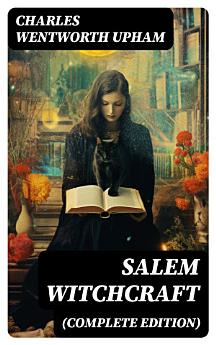Salem Witchcraft (Complete Edition): The Real History & Background of the Greatest Witch Hunt Trials in America
Charles Wentworth Upham
Dec 2023 · DigiCat
Ebook
621
Pages
family_home
Eligible
info
reportRatings and reviews aren’t verified Learn More
About this ebook
In "Salem Witchcraft (Complete Edition)", Charles Wentworth Upham delves deep into the haunting events of the Salem Witch Trials, crafting a comprehensive narrative that is both meticulously researched and deeply reflective. The book employs a narrative style that intertwines historical documentation with vivid storytelling, illuminating the social and psychological dynamics of a community gripped by fear and superstition. Upham not only chronicles the events of 1692 but also situates them within a broader context of Puritan New England, exploring themes of hysteria, morality, and the unsettling intersection of religion and law that influenced the trials' trajectory. Upham, a prominent 19th-century historian and member of the Massachusetts legislature, was profoundly influenced by the intellectual currents of his time, including the rise of rationalism and an evolving understanding of human rights. His own ancestral ties to Salem, coupled with his deep commitment to justice and understanding of civic duty, propelled him to explore the tragic consequences of fanaticism through the lens of historical scholarship. His work serves as both a cautionary tale and a critique of societal ostracism and mob mentality. Readers interested in American history, particularly the complexities of the Salem trials, will find Upham's work an invaluable resource. This complete edition not only captures the essence of the events but also provokes critical reflection on contemporary societal issues, making it a timeless read that resonates with modern themes of injustice and the power of fear.
About the author
Charles Wentworth Upham (1802–1875) was a multifaceted individual, esteemed as an American congressman, historian, and pastor. Born in St. John, New Brunswick, he grew up in Salem, Massachusetts, an area that would deeply influence his scholarly pursuits. Upham attended Harvard College, graduating in 1821 before embarking on a career that melded politics and theology. His tenure in the Massachusetts State Legislature, followed by two terms in the United States House of Representatives, was characterized by his advocacy for moral issues, including temperance and abolition. After his political career, Upham focused on pastoral work at the First Church in Salem and later on historical research. He is most renowned for his seminal work on the Salem witch trials, 'Salem Witchcraft (Complete Edition)', a comprehensive two-volume set first published in 1867. This meticulously detailed account remains among the most frequently cited references on the subject and is a testament to his methodical approach and his literary style, which balances narrative with exhaustive documentation. Upham's work is not without its critics, particularly regarding the author's stance on the role of certain individuals in the witch trials; nevertheless, it stands as an essential contribution to early American history and to the study of the social dynamics of witchcraft accusations.
Rate this ebook
Tell us what you think.
Reading information
Smartphones and tablets
Install the Google Play Books app for Android and iPad/iPhone. It syncs automatically with your account and allows you to read online or offline wherever you are.
Laptops and computers
You can listen to audiobooks purchased on Google Play using your computer's web browser.
eReaders and other devices
To read on e-ink devices like Kobo eReaders, you'll need to download a file and transfer it to your device. Follow the detailed Help Center instructions to transfer the files to supported eReaders.







